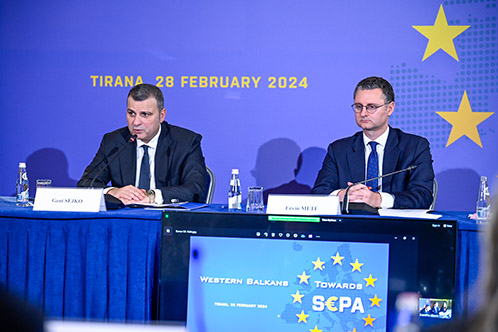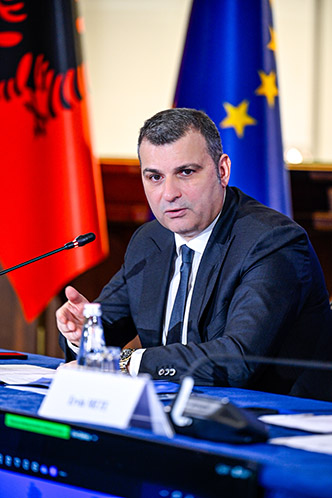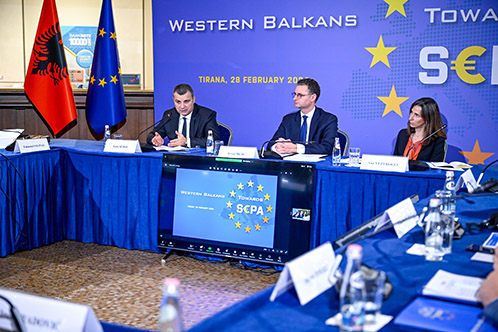BANK OF ALBANIA
PRESS RELEASE
Governor Sejko: Remarks at the Ministerial “WB 6 towards the Single Euro Payments Area”
Publication date: 28.02.2024
Dear Ministers and fellow Governors,
It is a pleasure for me to be part of this Ministerial which once again emphasizes the importance of the financial and economic integration among our countries with the European Union.
It is natural that economic integration has always been an important driver in the international arena for enhancing collaboration and promote integration even in other spheres, and it is obviously the basic principal of the creation and functioning of the European Union.
I am glad to mention that the real and tangible integration within the region and with the European Union is starting form payment systems and services. In this line of argument, I think that we are creating the rails for a modern and inclusive payment market which is going to serve a modern and high speed train for our economic exchange among the region and with the EU. This can be easily achieved with the participation of our countries in the SEPA.

Bank of Albania views SEPA as a major catalyst for more financial integration with Europe. The EU has provided us with an opportunity to enter the European market long before the EU membership really happens. We should take the most advantage from it. The SEPA is important on many levels. First, it fosters an efficient and reliable payment systems for small countries like Albania. By standardizing cross border payments and employing advanced technology, it will be possible to create a more modern payment market, in line with European policies, and to increase the penetration of information technology. Second, the participation in SEPA is expected to improve competition in the retail payment market. It improves the transparency and reliability of the products offered to the public for cross-border payments. From a central bank’s point of view, the establishment of a modern, competitive and reliable payment system contributes to a more efficient and productive payments market and consequently enhance efficiency and productivity in the economy, benefitting to all its citizens. Yet, modernizing Albania’s payment system and integrating it in the wider European market, will bring benefits beyond those directly deriving from the introduction of advanced standards.
Easing cross-border payments with EU is expected to boost trade. Albania’s main trading partner is EU, with more than half of trade in goods and services being routed to these countries. Also, more than half of FDIs stock originates from EU countries. On the other hand, the participation in SEPA inevitably is going to support the trade among the region, and become a buster to economic activity. In this regard, I would like to mention that the trade activity and the exchange of services and tourism has increased among our 6 countries in the recent years and it is expected to further intensify with the infrastructural development undertaken in transportation.

Our labour migration is concentrated in EU and almost all remittances flows from EU and United Kingdom, which is also a SEPA’s member. Remittances account for almost 9% of the GDP. Most of the cross-border financial transactions take place with EU countries. Hence, the economic benefits from having greater efficient payments in terms of costs, time and safety are enormous. These benefits, I believe are mutual, as the European counterparts can be sure they are receiving same treatment. Introducing SEPA payments will bring positive changes in the habits of our companies and households, in terms of payment methods.
Bank of Albania is leading the project on SEPA membership, on behalf of the Albanian payment community. We have made considerable progress in aligning our payment legislation with the European one, as it was mentioned also in the presentation by the World Bank. The presentation clearly highlights that Albania is almost ready for participating into SEPA.
I would like to emphasize that the achievements that we saw are the results of long lasting efforts in the context of the integration process, but as well as of our joint efforts on modernising domestic retail payment market in Albania through the mid-term National Retail Payment Strategy. I referred intentionally to the strategy aiming to underline the fact that, Albania, - but I am sure that this is the case even for other countries of the region-, is naturally aligning with the European standards, even when the latter are not imposed as an obligation, but as a choice.

Thus, in the framework of this strategy, we have harmonised the European legislation on payments centred on the Payment Services Directive (PSD2) and E –Money Directive, which at the same time are fundamental for the success of SEPA. Since 2018, Albania intensified its efforts in this regard with the drafting and approval of the Law on Payment Services and the regulatory framework enforcing the Law. Actually, we are reaping tremendous results in our market in terms of innovation and competition. Since 2020 we have 6 new institutions in the market while they are operating more than 200 thousands payment accounts in the market in 2023. This figure has been tripled in comparison with 2022. In this light, I would like to emphasise that, to a certain extent, due to the activity of an e-money institution which is operating also in EU, our market is enjoying the benefits of SEPA in terms of cost and time efficiency making the expected results more tangible to the general public.
Additionally, Albanian market is in its final stage of the implementation of the open-banking and strong customer authentication which is going to embrace all the innovation intended by PSD2. In this regard, - the full transposition of PSD2 in the Albanian legislation supports our mutual objective on participating into SEPA and creates new opportunities for our market with the presentation into the “SEPA Payment Account Access (SPAA) scheme”. The membership in this scheme increases interoperability of open banking services among SEPA countries and creates new opportunities for payment service providers in the sphere of e-commerce and digital payments into SEPA.
Beyond PSD2 and E- Money 2 Directive we have taken action in implementing other legal and regulatory acts associated with SEPA, such as the Credit Requirements Directive (CRD) and AML Directive, which are in compliance with SEPA requirements. These legal compliances and the removal of Albania from the FATF grey list last year imply that we fulfil all the preconditions needed for SEPA accession. On the other hand given that our banking system activity is dominated by pan-european banking groups, it can facilitate integration to SEPA systems.
Additionally, Albania has also undertaken action in the transposition of SEPA regulation. Thus, in 2021 Bank of Albania has approved the regulation 50/2021 “On direct debit'”, which further aligns the SEPA standards in the Albanian market and the requirements of SEPA regulation. Additionally, with the assistance from the World Bank we have drafted a regulation for SEPA euro-denominated transactions which intends to fulfil all the SEPA access requirements in relation to this act. We are currently discussing this draft for approval.
In addition to legal and regulatory interventions, we have undertaken several actions in terms of infrastructural developments aiming to facilitate the SEPA accession. In more details, we are working on the upgrade of our domestic payment systems aiming to further align with ISO 20022 communication standards and SEPA technical requirements. This project, even though it is not designed for the SEPA accession, will prepare the market with the SEPA technical requirements in an organised and centralised perspective.
In relation to SEPA, our next important project is implementing infrastructure for fast payments. This is something that we have started to think of long ago. Fast Payments enable transfers of fund 24/7, by utilizing innovative means. They can facilitate cross-border trade, enhance competition and reduce costs. We have considered different options to implement fast payments, by looking at different country experiences and features. Indeed there are many solutions for fast payments and their success depends greatly from the level of payment services developments in the country that is implementing it. We are very thankful to have the World Bank assist us in this project as well. Since our aim is to join SEPA, it makes sense that the solution for fast payment will be one that is compatible with SEPA.
Finally, taking into consideration that Albania is almost ready from legal and regulatory point of view with the SEPA criteria, we have intensified our efforts in preparing the application. For this purpose we are drafting an action plan which is going to be shared also with the respective government institutions involved in the process. At the same time, we are taking actions on creating bridges of communication with European Payment Council aiming to address any need during the drafting of the application.
I would like to emphasise that SEPA accession has become a national priority for us and we have the full support of the Albanian Government to accelerate this process. Based on other experiences this collaboration and supportive action is crucial for achieving a quick and efficient application process within the time limits that we have defined. Taking in to account the importance that SEPA accession has for Albanian we are fully engaged to finalise the application process within June 2024. We know that this deadline may be evaluated as very ambitious but taking into account the full support and assistance form the World Bank and European Commission it is evaluated as an achievable objective.
In this direction, allow me to express a special thank you to the World Bank and their long-lasting assistance in the area of payment system. Inevitably their contribution and support has created the sound bases for Albania to be vanguard in the process.
Additionally a special gratitude to the European Commission for the support and creating the proper ground for our countries to accelerate integration with the EU.
Once again, allow me to emphases the full commitment of Bank of Albanian in fulfilling this historical objective for our country.
Let me conclude by reiterating the importance of SEPA participation for all the region and kindly invite all Western Balkan countries to intensify our efforts on fulfilling this important objective which, as was mentioned several times today, is going to integrate our markets within the region and with the European Union. Unenviably this process due to the different stage compliance cannot be a joint and stimulates action for all of us, however we can share experiences and support each other in the process. From this perspective, and taking into account that Albanian is intending to complete the application really soon, I would like to express our full engagement and readiness to share with the other peer Central Banks our experience and lessons learned by the whole process.
Thank you!

 Twitter
Twitter
 Youtube
Youtube
 Facebook
Facebook
 Flickr
Flickr
 RSS
RSS
 Subscribe
Subscribe
 Feedback
Feedback